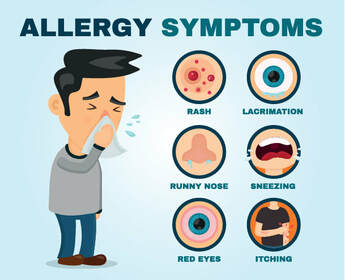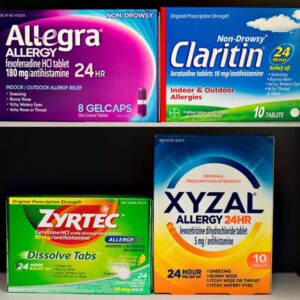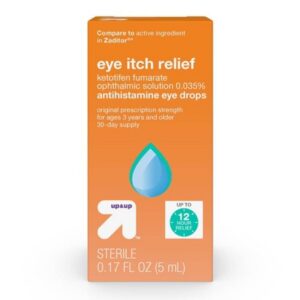Allergy Relief? Sinus up! By Our Student Pharmacist, Cat Mechler.
What are allergies?
Allergies are a result of your body overreacting to foreign objects, that we call allergens. Seasonal allergies are fairly common as there are many allergens that can trigger an allergic reaction, including(1):
- Pet dander
- Dust mites
- Grass
- Weeds
- Trees
- Mold
Symptoms of seasonal allergies are similar to those of a cold and include(1):
- Itchy/watery eyes
- Congestion
- Runny/itchy nose
- Sneezing
- Skin rash
When can I get allergy symptoms?
Typically, allergies can begin as early as the end of February and last until the end of the summer. However, you may experience these symptoms at any time during the year, depending on where you are in the country. The specific allergen that’s triggering your allergies can also affect when you get them.(2)
What can I do to treat them?
The best thing you can do to prevent these symptoms is to avoid the allergen. Monitoring pollen counts, keeping windows and doors shut, and taking a shower after you’ve been outside during allergy season are a few ways to help minimize your risk of experiencing allergy symptoms.(2)
It’s not always possible to completely avoid triggers. There are a variety of options that can be found over the counter (OTC) to help control your allergies. At first, the amount of OTC allergy products can seem overwhelming; however, there are generally 5 different types of products to choose from:
- Glucocorticoid nasal sprays are the most effect single treatment to help relieve(3):
- Congestion
- Runny/itchy nose
- Sneezing
These nasal sprays may cause local irritation, including drying or burning of the nose or throat. Another important thing to know is that these medications can take several days to weeks of daily use to see the full effects.
Examples include:
- budesonide (Rhinocort)
- fluticasone propionate (Flonase)
- triamcinolone (Nasacort)
Be careful not to pick out a nasal decongestant spray, like phenylephrine or oxymetazoline. These are not recommended for the routine treatment of seasonal allergies.
- Nasal Saline – Saline spray or irrigation can be beneficial for milder symptoms and offers some relief for:
- Runny nose
- Itchy throat
- Congestion
It’s important to remember if using the nasal saline irrigation to always use distilled, sterilized, or boiled water that has cooled to room temperature to kill any potentially infectious organisms.(4)
- Oral antihistamines – Good option if you’re looking for something to help control mild to moderate symptoms, especially:
- Itching
- Sneezing
- Runny nose
These medications are less effective for congestion in comparison to the glucocorticoid nasal sprays.(5) Additionally, antihistamines often cause sleepiness. First generation antihistamines, including diphenhydramine (Benadryl), are more sedating than others. Typically, second generation oral antihistamines are less sedating and are therefore preferred to help treat allergy symptoms.
Less sedating second generation antihistamines include:
- cetirizine (Zyrtec)
- levocetirizine (Xyzal)
- loratadine (Claritin)
- fexofenadine (Allegra)
Some other side effects of these medications could include dry eyes and mouth.
- Antihistamine eye drops – Option that offers relief for itchy or red eyes
Refrigeration or using refrigerated artificial tears prior to the antihistamine eye drops may help to reduce burning/stinging sensation upon installation. Other side effects could include increased eye dryness or headache. (6)
Examples include:
- ketotifen (Alaway or Zaditor)
- olopatadine (Pataday)
- Artificial tears are another option to help with dry eyes that would in turn reduce redness.
Of course, if you’re having trouble picking the product that will work best for you, feel free to ask the pharmacist!
Sometimes OTCs aren’t enough to control your allergies and you might have to go to a doctor who specializes in allergy control. They might suggest immunotherapy or allergy shots. These are very effective in treating your persistent allergy symptoms and may even make you “less allergic” over time.(2)
References:
- https://www.healthline.com/health/allergies#treatments
- https://acaai.org/allergies/seasonal-allergies
- Dykewicz MS, Wallace DV, Baroody F, et al. Treatment of seasonal allergic rhinitis: An evidence-based focused 2017 guideline update. Ann Allergy Asthma Immunol. 2017;119(6):489-511.
- https://www-fda-gov.proxy.lib.ohio-state.edu/consumers/consumer-updates/rinsing-your-sinuses-neti-pots-safe
- Kaszuba SM, Baroody FM, deTineo M, Haney L, Blair C, Naclerio RM. Superiority of an intranasal corticosteroid compared with an oral antihistamine in the as-needed treatment of seasonal allergic rhinitis. Arch Intern Med. 2001;161(21):2581-2587.
- Allergic conjunctivitis: Management. UpToDate. Wolters Kluwer. Hudson, OH. Available at: https://uptodate.com. Accessed August 18, 2020.
- https://santafeent.com/sinus-allergy/allergies-overview/allergic-rhinitus/






